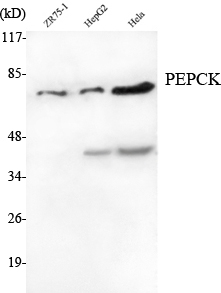PEPCK Monoclonal Antibody
- Catalog No.:YM1074
- Applications:WB
- Reactivity:Human;Mouse;Rat;Bovine;Dog;Pig
- Target:
- PEPCK
- Fields:
- >>Glycolysis / Gluconeogenesis;>>Citrate cycle (TCA cycle);>>Pyruvate metabolism;>>Metabolic pathways;>>PPAR signaling pathway;>>FoxO signaling pathway;>>PI3K-Akt signaling pathway;>>AMPK signaling pathway;>>Insulin signaling pathway;>>Adipocytokine signaling pathway;>>Glucagon signaling pathway;>>Insulin resistance;>>Proximal tubule bicarbonate reclamation
- Gene Name:
- PCK2
- Protein Name:
- Phosphoenolpyruvate carboxykinase [GTP] mitochondrial
- Human Gene Id:
- 5106
- Human Swiss Prot No:
- Q16822
- Mouse Gene Id:
- 74551
- Mouse Swiss Prot No:
- Q8BH04
- Immunogen:
- Purified recombinant human PEPCK (C-terminus) protein fragments expressed in E.coli.
- Specificity:
- PEPCK Monoclonal Antibody detects endogenous levels of PEPCK protein.
- Formulation:
- Liquid in PBS containing 50% glycerol, 0.5% BSA and 0.02% sodium azide.
- Source:
- Monoclonal, Mouse
- Dilution:
- WB 1:1000 - 1:2000. Not yet tested in other applications.
- Purification:
- Affinity purification
- Concentration:
- 1 mg/ml
- Storage Stability:
- -15°C to -25°C/1 year(Do not lower than -25°C)
- Other Name:
- PCK2;PEPCK2;Phosphoenolpyruvate carboxykinase [GTP]; mitochondrial;PEPCK-M;Phosphoenolpyruvate carboxylase
- Molecular Weight(Da):
- 71kD
- Background:
- This gene encodes a mitochondrial enzyme that catalyzes the conversion of oxaloacetate to phosphoenolpyruvate in the presence of guanosine triphosphate (GTP). A cytosolic form of this protein is encoded by a different gene and is the key enzyme of gluconeogenesis in the liver. Alternatively spliced transcript variants have been described. [provided by RefSeq, Apr 2014],
- Function:
- catalytic activity:GTP + oxaloacetate = GDP + phosphoenolpyruvate + CO(2).,cofactor:Binds 1 manganese ion per subunit.,cofactor:Manganese.,disease:Defects in PCK2 are the cause of mitochondrial phosphoenolpyruvate carboxykinase deficiency (mitochondrial PEPCK deficiency) [MIM:261650]. PEPCK deficiency is a metabolic disorder resulting from impaired gluconeogenesis. It is a rare disease with less than 10 cases reported in the literature. Clinical characteristics include hypotonia, hepatomegaly, failure to thrive, lactic acidosis and hypoglycaemia. Autoposy reveals fatty infiltration of both the liver and kidneys. The disorder is transmitted as an autosomal recessive trait.,function:Catalyzes the conversion of oxaloacetate (OAA) to phosphoenolpyruvate (PEP), the rate-limiting step in the metabolic pathway that produces glucose from lactate and other precursors derived from the citric acid
- Subcellular Location:
- Mitochondrion.
- Expression:
- Liver,Neuroblastoma,Placenta,
- June 19-2018
- WESTERN IMMUNOBLOTTING PROTOCOL
- June 19-2018
- IMMUNOHISTOCHEMISTRY-PARAFFIN PROTOCOL
- June 19-2018
- IMMUNOFLUORESCENCE PROTOCOL
- September 08-2020
- FLOW-CYTOMEYRT-PROTOCOL
- May 20-2022
- Cell-Based ELISA│解您多样本WB检测之困扰
- July 13-2018
- CELL-BASED-ELISA-PROTOCOL-FOR-ACETYL-PROTEIN
- July 13-2018
- CELL-BASED-ELISA-PROTOCOL-FOR-PHOSPHO-PROTEIN
- July 13-2018
- Antibody-FAQs
- Products Images

- Western Blot analysis using PEPCK Monoclonal Antibody against ZR75-1, HepG2, HeLa cell lysate.



